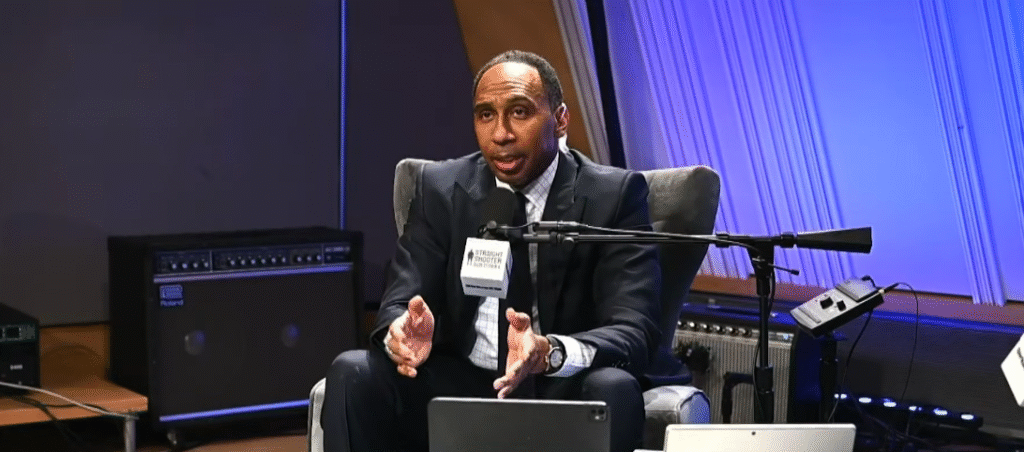Although Stephen A. Smith’s expulsion from NBA Countdown caused instant conjecture, the truth was much more measured. As part of a strategic realignment under his new contract, the ESPN mainstay, who was well-known for his dominant presence on First Take, decided to leave the basketball pregame show. It was a purposeful change of direction by one of the most powerful voices in sports broadcasting, not a dismissal.
On The Stephen A. Smith Show, Smith gave a direct explanation of the circumstances, stressing that his choice was both deliberate and sensible. He stated bluntly, “I negotiated coming off of it,” explaining how his schedule had grown unmanageable. He clarified that he didn’t have much time for lengthy doubleheaders because he had to balance First Take, his radio show, and production duties. He made sure his audience understood that this was his call, not ESPN’s, by speaking in a measured but firm tone.
Malika Andrews will now lead ESPN’s new NBA Countdown lineup, which also includes Kendrick Perkins, Brian Windhorst, Mike Malone, and Shams Charania. This reorganization is a major moment for the network. The combination reflects the network’s changing approach, which combines modern media appeal with seasoned analysis. The change feels both new and uncertain, though, because Smith’s absence takes away a personality that has been incredibly successful at igniting on-air debates.
| Category | Details |
|---|---|
| Full Name | Stephen Anthony Smith |
| Born | October 14, 1967 |
| Birthplace | New York City, U.S. |
| Nationality | American |
| Occupation | Sports Broadcaster, Journalist, Television Personality |
| Education | Winston-Salem State University |
| Employer | ESPN |
| Shows | First Take, The Stephen A. Smith Show, formerly NBA Countdown |
| Contract | Five-year ESPN deal reportedly worth $100 million |
| Reference | USA Today Sports |

However, Smith’s impact goes well beyond a single studio. He is now an enterprise rather than just a commentator thanks to his five-year, $100 million contract, which is among the biggest in sports media. Morning sports television is dominated by his daily show First Take, and he is closely associated with NFL coverage due to his appearance on Monday Night Countdown. This wider scope implies that Smith’s exit from NBA Countdown was more of an energy realignment than a retreat.
The choice exemplifies a growing pattern among prominent media personalities: sacrificing quantity for control. Relentlessness, a never-ending grind that reflects an athlete’s work ethic, has characterized Smith’s career. However, he is becoming more concerned with longevity as he ventures into executive production and political commentary. It’s a very creative move that demonstrates that even dynamic personalities understand the importance of sustainability in media careers.
As expected, the online responses were strong. Some speculated about creative differences, while others believed ESPN had pushed Smith aside due to internal cost-cutting. But the noise was muffled by his calm reply. He referred to Perkins as his “brother,” hailed Malone’s coaching acumen, and hailed Andrews as “fabulous.” Compared to his previous media confrontations, that humility felt noticeably better, showing a man who has grown up with his notoriety.
Smith’s choice also illustrates the increasing trend of broadcasters becoming more diverse. He is evolving from an employee into a brand ecosystem, much like Pat McAfee or Shannon Sharpe. He is working on political and entertainment projects through his production company, which calls for time and independence. He gets just that when he leaves Countdown. Smith is building a career that will be especially advantageous for long-term impact by utilizing his ESPN platform and branching out into independent endeavors.
From a business standpoint, the network’s reorganization is also very effective. ESPN is concentrating on team-driven programming and combining star salaries. The network maximizes ratings without overstretching its top talent by having Smith focus on his flagship properties. Although his absence from Countdown might seem noteworthy, his appearance on First Take still serves as a mainstay for the network’s daily audience.
There are even cultural ramifications to the move. For years, the public’s opinion of basketball players like Kyrie Irving, LeBron James, and Kevin Durant was influenced by Smith’s acrimonious arguments. Though frequently divisive, his insightful commentary provided fans with a lens through which to view the drama of contemporary sports. That conversation takes on a more collected, critical tone when he isn’t on Countdown. It bears a striking resemblance to the trend of sports coverage on various networks becoming less personality-driven and more data-driven.
Smith’s voice is still audible everywhere. His podcast reach is especially creative, fusing politics, sports, and culture in ways that few commentators dare to try. His social media influence is enormous. He is changing the definition of what it means to be a contemporary broadcaster with this adaptability. The conventional TV studio is now just one stage among many; it is no longer the ceiling.
The wider industry conclusion is that media personalities now need to be flexible. Smith showed incredible self-awareness by choosing to step aside, understanding when to change course before exhaustion impairs performance. His strategy is very clear: preserve the energy that initially created his empire, grow the portfolio, and safeguard the brand.
Smith’s departure from NBA Countdown presents both a risk and an opportunity for ESPN. The network loses one of its most active communicators but gains room to develop younger voices. Smith says the move gives him more freedom to work on projects that fit his goals, such as documentaries and political talk shows. It’s a trade-off that demonstrates how careers can advance without going backward.

